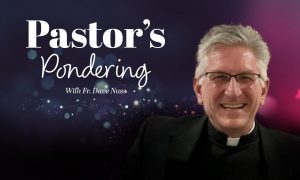Today, Palm Sunday, we hear the account of Jesus’ Passion according to Luke’s Gospel (Luke 22:14-23:56). Unique features of Luke’s account are worthy of our consideration.
Luke’s recounting of the Last Supper is much longer than Matthew and Mark. Only Luke records Jesus having commanded, “Do this in memory of me” (22:19). Accordingly, Luke posits that the followers of Jesus must not only celebrate Eucharist, but actually live Eucharist.
When Jesus is arrested in the midst of his prayer at Gethsemane, he says, “This is your hour, the time for the power of darkness” (22:53). We recall Luke’s ominous conclusion to Jesus’ earlier temptation in the desert: “He [Satan] departed from him [Jesus] for a time” (4:13). That time now has arrived.
Throughout the scene in the Garden, Luke emphasizes Jesus at prayer, his radical openness to God the Father, contrasted starkly by the disciples who fail to pray. Later, when Peter denies Jesus, Luke has Jesus cast a clear forgiving gaze Peter’s way and then Peter is overwhelmed by tears of repentance.
Throughout the Roman Trial, Pilate seems convinced of Jesus’ innocence and sends him to Herod. An arrogant tyrant, Herod is interested in playing games and Jesus will have nothing to do with the false king and is returned to Pilate who appears forced to convict Jesus of a crime for which he is innocent.
On the way to Golgotha, Simon of Cyrene is coerced to help Jesus. Curiously Luke describes that the cross is placed on Simon’s shoulders and that he carries it behind Jesus. In this way, Luke emphasizes the right role of a disciple:
“If anyone wishes to come after me, he must deny himself and take up his cross daily and follow me. For whoever wishes to save his life will lose it, but whoever loses his life for my sake will save it” (9:23-24).
Continuing along appear inconsolable women to whom Jesus tells them to prepare for future suffering, giving indication of the cataclysmic destruction that will befall the Temple and all of Jerusalem in 70AD:
“Daughters of Jerusalem, do not weep for me; weep instead for yourselves and for your children, for indeed, the days are coming when people will say, ‘Blessed are the barren, the wombs that never bore and the breasts that never nursed’” (23:28-29).
At Golgotha, Jesus’ first says, “Father, forgive them, they know not what they do” (23:34). Again, Jesus’ innocence is acclaimed, this time by a guilty criminal crucified alongside him, and Jesus promises him paradise. His accusers keep crying out, “He saved others, let him save himself if he is the chosen one, the Messiah of God” (23:35). For Luke, Jesus’ death has nary a thing to do about saving himself and instead has everything to do with saving others.
As Jesus’ death nears, darkness comes over the whole land, the sun disappears, the veil of the temple is torn down the middle opening the holy of holies to the entire world (cf. 23:44-45). In the other Gospel accounts, these things are recorded after Jesus’ death with their emphasis placed more upon the finality of Jesus’ passing.
After Jesus’ death Luke records a centurion as having said, “This man was innocent beyond doubt” (23:47).
Finally, we must keep before us that this is not the end which will culminate in a few days in Jesus’ Resurrection on Easter Sunday.
Come, Lord Jesus!

